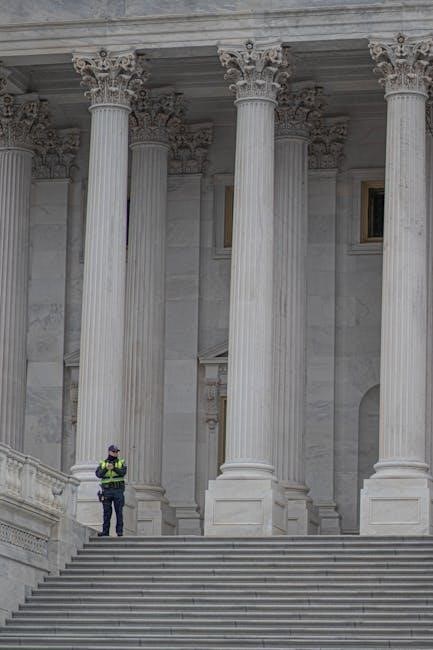The Scout Oath and Law are foundational principles guiding Scouts’ behavior and decisions, emphasizing trustworthiness, respect, and service to others. They form the core of Scouting values.
Overview of the Scout Oath and Law

The Scout Oath and Law are the cornerstone of the Scouting movement, providing a moral framework for Scouts worldwide. The Scout Oath is a promise to uphold values such as duty to God, country, and others, while the Scout Law serves as a code of conduct. Together, they guide Scouts in making ethical decisions and fostering positive behavior. The Oath emphasizes trustworthiness, respect, and service, while the Law outlines 12 points, including being loyal, helpful, and reverent. These principles are universal, applying to all Scouts regardless of cultural or religious background. By living the Oath and Law, Scouts develop character, leadership skills, and a commitment to community service. These ideals are central to the Scouting experience, shaping Scouts into responsible and compassionate individuals.
Importance of the Scout Oath and Law in Scouting
The Scout Oath and Law are the bedrock of the Scouting movement, instilling vital values that shape Scouts into responsible and compassionate individuals. They serve as a moral compass, guiding Scouts to act with integrity, respect, and kindness. By committing to the Oath and Law, Scouts develop a strong sense of duty to themselves, others, and their communities. These principles foster teamwork, empathy, and self-discipline, essential for personal growth and leadership development. The Oath and Law also encourage Scouts to contribute to society through service, promoting a culture of giving and citizenship. Their timeless relevance ensures Scouts remain grounded in ethical behavior, preparing them to face life’s challenges with confidence and character. By embracing these ideals, Scouts create a positive impact in their communities and beyond.
Structure and Content of the Scout Oath and Law
The Scout Oath is a solemn promise made by Scouts, outlining their commitment to duty, others, and self. It consists of three key components: duty to God and country, helping others, and obeying the Scout Law. The Scout Law, on the other hand, is a code of 12 points that define ideal behavior, such as being trustworthy, loyal, and kind. Together, the Oath and Law form a comprehensive guide for Scouts, providing a clear framework for ethical decision-making and conduct. Their structure is designed to be memorable and applicable in all aspects of life, ensuring Scouts embody these principles in their daily actions and interactions. This foundational framework is universally accepted across Scout organizations worldwide, making it a unifying element of the Scouting movement.

The Scout Oath
The Scout Oath is a promise to uphold values of duty, service, and integrity, forming the moral foundation for Scouts worldwide, guiding their actions and decisions.
Origins and History of the Scout Oath
The Scout Oath was created by Robert Baden-Powell, the founder of Scouting, and first appeared in the 1910 edition of Scouting for Boys. It was designed to inspire Scouts to live by a set of moral guidelines. The Oath has undergone minor revisions over the years, with the most significant change occurring in 1967 to make the language more inclusive. Originally, the Oath emphasized loyalty to God, country, and others, reflecting the values of the time. Its evolution has ensured its relevance across generations and cultures. The Scout Oath remains a cornerstone of Scouting worldwide, serving as a promise to uphold values of honesty, duty, and self-discipline. Its enduring presence highlights its importance in shaping the character of Scouts globally, fostering a sense of responsibility and moral direction.
Key Components of the Scout Oath
The Scout Oath is a promise that outlines the core values Scouts commit to uphold. It consists of three main parts: duty to God, loyalty to country, and service to others. These components emphasize trustworthiness, respect, and self-discipline. The Oath also includes a commitment to helping others at all times, which reflects the importance of kindness and generosity. Additionally, it highlights the importance of keeping oneself morally straight, physically strong, and mentally awake. Each part of the Oath serves as a guide for Scouts to live by, fostering a sense of responsibility and ethical behavior. By adhering to these principles, Scouts strive to make a positive impact in their communities and the world at large, embodying the values of Scouting in their daily lives.
Interpretation of the Scout Oath in Modern Contexts
The Scout Oath remains a timeless promise, yet its interpretation evolves to align with contemporary values and challenges. In today’s diverse world, the Oath emphasizes inclusivity, respect, and service to all people, regardless of background. The commitment to duty, whether to God or a higher principle, encourages Scouts to uphold personal beliefs while respecting others. Helping others at all times is interpreted as active participation in community service and advocacy for social justice. Being morally straight is seen as maintaining ethical behavior in a complex, often digital, world. The focus on physical and mental strength highlights the importance of holistic well-being and resilience. By living the Scout Oath, Scouts embody values that foster a better, more compassionate society, adapting these principles to address modern issues like environmental stewardship and global citizenship.
How the Scout Oath Guides Scout Behavior

The Scout Oath serves as a moral compass, guiding Scouts to act with integrity, respect, and responsibility. It emphasizes duty to God, country, and others, fostering a sense of accountability and loyalty. The promise to help others at all times encourages selflessness and compassion, while the commitment to being prepared promotes readiness and responsibility. By reciting the Oath, Scouts pledge to uphold these values, which shape their decisions and actions in daily life. The Oath’s principles inspire Scouts to prioritize service, honesty, and kindness, creating a foundation for ethical behavior in all situations. This commitment to uphold the Oath ensures Scouts strive to be role models, contributing positively to their communities and beyond.

The Scout Law
The Scout Law is a code of conduct outlining 12 virtues Scouts strive to live by, fostering trustworthiness, respect, and service to others and the community.
Origins and Evolution of the Scout Law
The Scout Law, created by Robert Baden-Powell, was first introduced in 1908 as part of the Scouting movement. Originally, it consisted of nine points, emphasizing virtues like trustworthiness and loyalty. Over time, the Law evolved to include twelve points, reflecting the changing values of society while maintaining its core principles. The updates aimed to make the language more inclusive and relevant to modern Scouts; The Scout Law serves as a moral compass, guiding Scouts in their daily lives and encouraging them to become responsible citizens. Its evolution ensures it remains a vital tool for character development, fostering respect, service, and integrity in Scouts worldwide. This foundation of Scouting continues to inspire youth to embody its principles in their actions and decisions.

12 Points of the Scout Law Explained
The Scout Law consists of 12 timeless principles that guide Scouts in their daily lives. Each point is designed to foster positive character traits:
A Scout is Trustworthy
, emphasizing honesty and reliability;
Loyal
, stressing devotion to family, community, and country;
Helpful
, encouraging service to others;
Friendly
, promoting kindness and inclusivity;
Courteous
, teaching respect and good manners;
Kind
, advocating compassion and empathy;
Obedient
, reinforcing respect for rules and authority;
Cheerful
, inspiring optimism even in challenging situations;
Thrifty
, promoting responsible resource management;
Brave
, building courage to stand up for what is right;
Clean
, emphasizing purity of thought, word, and deed; and
Reverent
, fostering faith and respect for the divine. Together, these principles create a moral framework for Scouts to live by, shaping their actions and decisions.
Practical Applications of the Scout Law
The Scout Law provides a practical guide for Scouts to apply its principles in their daily lives. It encourages Scouts to be trustworthy in their actions and words, demonstrating reliability in leadership roles. Loyalty is practiced through commitment to their groups, families, and communities. Scouts are helpful by actively volunteering and supporting those in need. Friendliness and courtesy foster positive interactions, while kindness and cheerfulness create an inclusive environment. Obedience to rules and authority ensures respect for societal norms. Thriftiness teaches Scouts to manage resources wisely, promoting sustainability. Bravery inspires them to stand up for what is right, even in difficult situations. Cleanliness and reverence guide Scouts to maintain purity in their actions and thoughts, while fostering faith and respect for the divine. These principles are applied through community service, team activities, and personal growth, helping Scouts become responsible and compassionate individuals. By living the Scout Law, Scouts develop strong moral character that benefits society.
Differences Between the Scout Oath and Law
The Scout Oath and Law are two cornerstone principles of Scouting, but they serve distinct purposes. The Scout Oath is a promise Scouts make to uphold their beliefs, duty to God and others, and commitment to self-improvement. It is a personal pledge that guides Scouts’ moral and ethical behavior. In contrast, the Scout Law is a set of 12 points that outline specific traits Scouts should strive to embody, such as trustworthiness, kindness, and bravery. While the Oath focuses on broader ideals, the Law provides practical guidelines for daily conduct. Together, they form a comprehensive framework for character development, but the Oath is more introspective, while the Law is action-oriented, shaping how Scouts interact with others and their communities. Understanding their differences helps Scouts apply these principles effectively in their lives.

Significance of the Scout Oath and Law
The Scout Oath and Law are vital for shaping character, promoting unity, and fostering a sense of duty. They inspire Scouts to act responsibly and ethically.
Role of the Scout Oath and Law in Character Development
The Scout Oath and Law play a pivotal role in shaping the moral and ethical foundation of Scouts. By pledging to uphold these principles, Scouts cultivate traits like trustworthiness, respect, and responsibility. The Oath encourages Scouts to commit to their beliefs and serve others, fostering a sense of duty and integrity. The Law, with its 12 points, provides a code of conduct that guides behavior, promoting honesty, kindness, and obedience. Together, they create a framework for Scouts to develop self-discipline, empathy, and a strong moral compass. This foundation helps Scouts navigate life’s challenges with confidence and integrity, preparing them to become responsible and compassionate individuals in their communities.
How the Scout Oath and Law Promote Teamwork
The Scout Oath and Law foster teamwork by emphasizing collective responsibility and shared values. The Oath’s promise to serve others and work for the common good encourages Scouts to collaborate towards mutual goals. The Law’s principles, such as loyalty, cooperation, and helpfulness, reinforce the importance of unity and supporting one another. Scouts learn to rely on each other’s strengths, building trust and communication skills. By adhering to these guidelines, Scouts develop a sense of accountability within a team, understanding that their actions contribute to the success of the group. This shared commitment to the Oath and Law strengthens bonds, promoting effective teamwork and a collaborative spirit in all Scouting activities.
Impact of the Scout Oath and Law on Community Service
The Scout Oath and Law profoundly influence Scouts’ engagement in community service by instilling a sense of duty and compassion. The Oath’s commitment to serving others and the Law’s emphasis on helpfulness, kindness, and cheerful service inspire Scouts to actively contribute to their communities. These principles motivate Scouts to undertake projects that address local needs, such as environmental conservation, food drives, and disaster relief. By adhering to the Oath and Law, Scouts develop a habit of selflessness and a desire to make a positive impact. This mindset fosters a culture of service, equipping Scouts to address societal challenges and improve the lives of others. The values outlined in the Oath and Law not only guide individual actions but also cultivate a lifelong commitment to community betterment.

Resources and Downloads
Official Scout Oath and Law PDFs are available for download, offering guides, printable versions, and educational tools to help Scouts and leaders understand these core principles.
Where to Find the Scout Oath and Law PDF
The Scout Oath and Law PDF can be easily accessed through official Scouting websites, such as scouting.org, or local Scout council websites. These documents are often provided as free downloads for Scouts, leaders, and parents. Additionally, official Scout shops and training materials may include printable versions of the Oath and Law. For convenience, many Scouting organizations offer digital copies that can be shared or printed for meetings and events. Ensure to verify the authenticity of the document by cross-checking it with official sources. Searching with keywords like “Scout Oath and Law PDF official” can help locate reliable downloads. Always prioritize official channels to guarantee accurate and up-to-date versions of these essential Scouting principles.
Official Scout Oath and Law Documents
Official Scout Oath and Law documents are published by recognized Scouting organizations, such as the Boy Scouts of America (BSA) or the World Organization of the Scout Movement (WOSM). These documents are available in various formats, including PDFs, brochures, and posters, to ensure accessibility for Scouts, leaders, and families. They are typically distributed through official Scouting websites, local council offices, and Scout shops. The documents are carefully designed to reflect the core values and principles of Scouting, serving as essential resources for training, ceremonies, and daily reference. Official versions are regularly updated to align with modern Scouting practices while maintaining the timeless principles of the Oath and Law. Always verify the source to ensure authenticity and accuracy.
Using the Scout Oath and Law in Training Materials
The Scout Oath and Law are integral to Scouting training, serving as the moral foundation for Scouts worldwide. Training materials often include the Oath and Law in PDF formats, making them easily accessible for leaders and Scouts. These documents are used in workshops, meetings, and online courses to teach Scouts about their promises and duties. Leaders incorporate the Oath and Law into lesson plans, using them to guide discussions on ethics, teamwork, and community service. The PDF versions are particularly useful for sharing and printing, ensuring consistency in training across different units. By integrating these principles into training materials, Scouting organizations help develop character and reinforce the values that define the movement. This consistent approach ensures that Scouts understand and apply the Oath and Law in their daily lives.

Practical Applications
The Scout Oath and Law provide practical guidelines for Scouts, helping them apply values like honesty and kindness in daily life and community service activities.
Teaching the Scout Oath and Law to New Scouts
Teaching the Scout Oath and Law to new Scouts is essential for building a strong foundation in Scouting values. Leaders should use engaging methods, such as discussions, role-playing, and real-life examples, to help Scouts understand and internalize these principles. Downloadable PDF resources, such as official Scout Oath and Law documents, can serve as valuable tools for teaching. Emphasizing the practical application of the Oath and Law in daily life encourages Scouts to adopt these values naturally. Additionally, incorporating the Oath and Law into meetings and activities reinforces their importance. By fostering a deep understanding, Scouts can develop strong character and a commitment to serving others, preparing them for lifelong adherence to these guiding principles.
Incorporating the Scout Oath and Law into Meetings
Incorporating the Scout Oath and Law into meetings helps reinforce their importance and ensures they remain central to Scouting activities. Leaders can start meetings with a recitation of the Oath and Law, followed by a brief discussion of their meanings. Using handouts or projected slides from the Scout Oath and Law PDF can visually reinforce these principles. Leaders should also connect the Oath and Law to the meeting’s agenda, such as linking service projects to the phrase “help other people at all times.” Encouraging Scouts to share personal examples of living the Oath and Law fosters accountability and understanding. Regular reminders and discussions ensure these values remain a guiding force in every Scout’s actions and decisions, both within and outside of meetings.
Scout Oath and Law in Outdoor Activities
The Scout Oath and Law play a vital role in guiding behavior during outdoor activities, ensuring Scouts act responsibly and respectfully in nature. By adhering to the Oath, Scouts commit to being trustworthy and reverent, fostering a deeper connection with the environment. The Law emphasizes kindness to others and respect for natural resources, aligning with the principles of Leave No Trace. Outdoor activities provide practical opportunities to live the Oath and Law, such as working together as a team, being prepared, and caring for the outdoors. Leaders can reinforce these values by discussing how the Oath and Law apply to specific outdoor scenarios, such as camping or hiking. Reflecting on these principles after activities helps Scouts see their relevance and importance in real-world settings.
The Scout Oath and Law are timeless principles guiding Scouts worldwide, shaping character, and fostering a commitment to service, respect, and integrity in everyday life and adventures.
The Scout Oath and Law are the cornerstone of Scouting, providing a moral framework for scouts worldwide. The Scout Oath is a promise to live by principles of duty, faith, and service, while the Scout Law outlines 12 virtues like trustworthiness and kindness. Together, they guide Scouts in making ethical decisions and fostering positive relationships. The Oath emphasizes loyalty to God, country, and others, while the Law encourages traits like obedience, cheerfulness, and thriftiness. These principles are universal, transcending cultural and generational boundaries, and are applied in daily life, outdoor adventures, and community service. By living the Scout Oath and Law, Scouts develop strong character, leadership skills, and a commitment to improving themselves and their communities. These timeless values remain central to Scouting’s mission of empowering young people for a better world.

Final Thoughts on the Relevance of the Scout Oath and Law
The Scout Oath and Law remain timeless principles that continue to inspire and guide individuals of all ages. Rooted in values such as trustworthiness, respect, and service, these principles are as relevant today as they were when first introduced. They provide a moral compass that helps Scouts navigate life’s challenges with integrity and compassion. By living the Oath and Law, Scouts not only develop strong character but also contribute to creating a more harmonious and responsible society. Their universal appeal ensures that these principles will continue to shape future generations, fostering leadership, teamwork, and a commitment to community service. The Scout Oath and Law are not just guidelines for Scouts—they are a way of life that transcends Scouting itself, offering wisdom and direction for all.

Be First to Comment